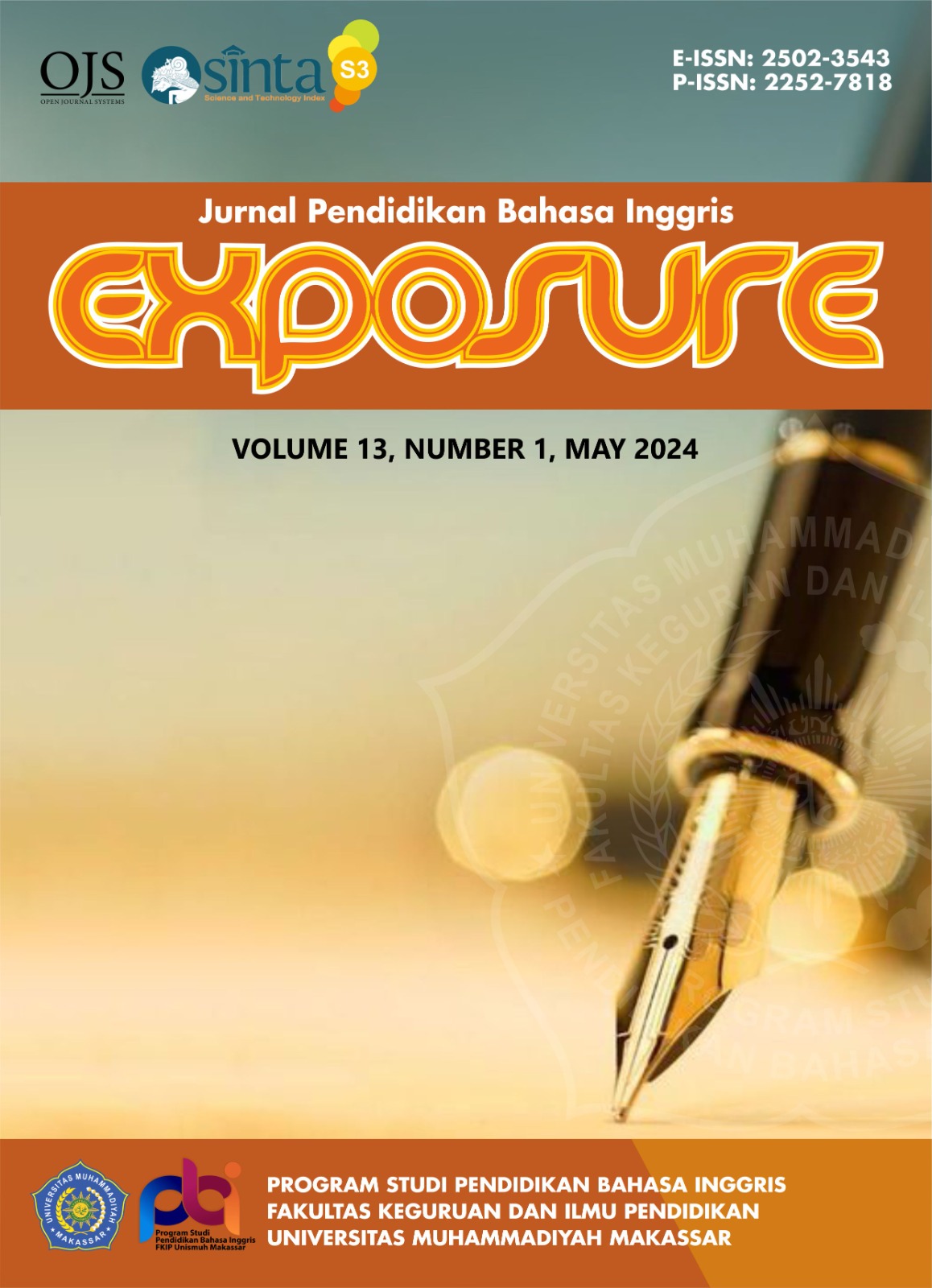THE IMPACT OF TASK-BASED INSTRUCTION IN IMPROVING STUDENTS’ AUTONOMOUS IN WRITING AT MECHANICAL ENGINEERING PROGRAM IN UKI TORAJA, INDONESIA
DOI:
https://doi.org/10.26618/exposure.v13i1.12766Keywords:
Task Based Instruction, Mechanical Engineering, Autonomous Task Based InstructionAbstract
This study is qualitative research which employs case study on Task-Based Instruction (TBI) impact on students’ autonomous learning at Mechanical Engineering in Teaching English at UKI utilized online questionnaire and interview student’s journal reflection as well as documentation. The research was carried out at Mechanical Engineering Department UKI Toraja, which located in Tanah Toraja, South Sulawesi. The research used purposive sampling method which involved 12 lecturers; 3 English lectures who were currently implementing Task-Based Instruction (TBI) in teaching English for Mechanical Engineering, 35 students of Mechanical Engineering, at UKI Toraja as the participants of this research. The data was analyzed by thematic analysis, content analysis, and document analysis. The findings reveal that different types of tasks and digital tools promote learner autonomy in different ways. Writing assignments allow students to work independently to choose a topic, create their written content, and choose online application software that allows them more freedom in exploring the understanding of a particular topic. Learning outcomes are characterized as Autonomous Task-Based Instruction in Teaching Writing because this strategy contributes to the degree of learning independence.
References
Anas, I., Amansyah, F., Musdariah, A., & Irmawati. (2020). Technological and pedagogical considerations in supporting electronic self-access language learning (e-sall): In-person learning practice in the time of crisis. SiSal Journal, 11(3), 128–134. https://doi.org/10.37237/110303
Bailey, S. (2015). Academic Writing A Handbook for International Students (fourth). New York: Routledge.
Benson, P. (2006). State-of-the-art article Autonomy in language teaching and learning. https://doi.org/10.1017/S0261444806003958
Chapelle, C. A. (2010). The spread of computer-assisted language learning The spread of computer - assisted language learning. Language Teaching, 43(January), 66–74. https://doi.org/10.1017/S0261444809005850
Ellis, R. (2009). The Methodology of Task-Based Teaching. Asian Journal of English Language Teaching, 11(5), 79–100.
Ellis, R. (2017). Position paper: Moving task-based language teaching forward Rod Ellis Curtin University, Perth (Australia). Language Teaching, 50(4), 1–28.
Hattani, H. A. (2020). The Implementation of Task-based Approach in ESP Instruction : Teachers and Students ’ Perceptions. International Arab Journal of English for Specific Purposes (IAJESP), 3(1), 67–82.
Kelly, M. G., & Anita, A. (2002). National Educational Technology Standards for Teachers: Preparing Teachers to Use Technology. National Educational Technology Standards for Teachers: Preparing Teachers to Use Technology, 2002. Political Science.
Lackman, K. (2016). Introduction to Task-based Learning The Willis model and variations (pp. 1–19). pp. 1–19. New York: Ken Lackaman & Assiciates.
Lai, C., & Li, G. (2011). Technology and Task-Based Language Teaching: A Critical Review. CALICO Journal, 28(2), 498–519.
M.P.Breen, & C.N.Candlin. (1980). The essentials of a Communicative Curriculum in Language Teaching. Applied Linguistics, 1(2), 82–112.
Maesin, A. (2009). A Study of Collaborative Learning among Malaysian Undergraduates. Asian Social Science, 5(7), 70–76.
Nunan, D. (2004). Task-based Language Teaching. Cambridge: Cambridge University Press.
Powers, D. (2008). Task-Based Instruction : From Concepts to the Classroom (Vol. 6).
Schwienhorst, K. (2007). Learner Autonomy and CALL Environments (1st ed.). https://doi.org/https://doi.org/10.4324/9780203012208
Sidupa, C. (2016). Fostering Learner s ’ Autonomy in Writing. Journal of English Education, 1(November), 158–164.
Tschirhart, C., & Elina, R. (2009). LondonMet e-packs : a pragmatic approach to learner / teacher autonomy. The Language Learning Journal, 37(1), 2009. https://doi.org/https://doi.org/10.1080/09571730802404394
Downloads
Published
Issue
Section
License
Authors who publish with this journal agree to the following terms:
In order to assure the highest standards for published articles, a peer review policy is applied. In pursue of the compliance with academic standards, all parties involved in the publishing process (the authors, the editors and the editorial board and the reviewers) agree to meet the responsibilities stated below in accordance to the Journal publication ethics and malpractice statement.
Duties of Authors:
- The author(s) warrant that the submitted article is an original work, which has not been previously published, and that they have obtained an agreement from any co-author(s) prior to the manuscript’s submission;
- The author(s) should not submit articles describing essentially the same research to more than one journal;
- The authors(s) make certain that the manuscript meets the terms of the Manuscript Submission Guideline regarding appropriate academic citation and that no copyright infringement occurs;
- The authors(s) should inform the editors about any conflict of interests and report any errors they subsequently, discover in their manuscript.
Duties of Editors and the Editorial Board:
- The editors, together with the editorial board, are responsible for deciding upon the publication or rejection of the submitted manuscripts based only on their originality, significance, and relevance to the domains of the journal;
- The editors evaluate the manuscripts compliance with academic criteria, the domains of the journal and the guidelines;
- The editors must at all times respect the confidentiality of any information pertaining to the submitted manuscripts;
- The editors assign the review of each manuscript to two reviewers chosen according to their domains of expertise. The editors must take into account any conflict of interest reported by the authors and the reviewers.
- The editors must ensure that the comments and recommendations of the reviewers are sent to the author(s) in due time and that the manuscripts are returned to the editors, who take the final decision to publish them or not.
Authors are permitted and encouraged to post online a pre-publication manuscript (but not the Publisher’s final formatted PDF version of the Work) in institutional repositories or on their Websites prior to and during the submission process, as it can lead to productive exchanges, as well as earlier and greater citation of published work (see The Effect of Open Access). Any such posting made before acceptance and publication of the Work shall be updated upon publication to include a reference to the Publisher-assigned DOI (Digital Object Identifier) and a link to the online abstract for the final published Work in the Journal.

